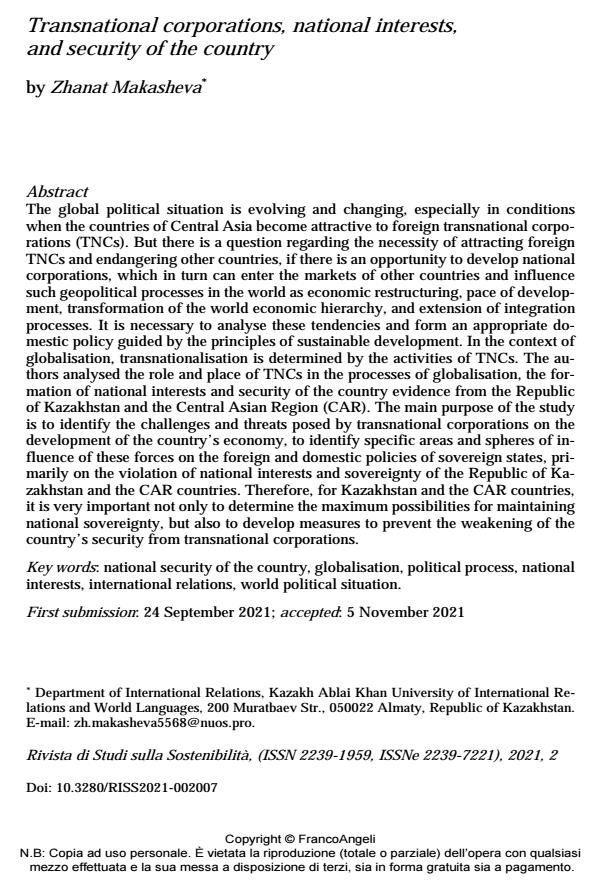Transnational corporations, national interests, and security of the country
Titolo Rivista RIVISTA DI STUDI SULLA SOSTENIBILITA'
Autori/Curatori Zhanat Makasheva
Anno di pubblicazione 2022 Fascicolo 2021/2
Lingua Inglese Numero pagine 15 P. 79-93 Dimensione file 111 KB
DOI 10.3280/RISS2021-002007
Il DOI è il codice a barre della proprietà intellettuale: per saperne di più
clicca qui
Qui sotto puoi vedere in anteprima la prima pagina di questo articolo.
Se questo articolo ti interessa, lo puoi acquistare (e scaricare in formato pdf) seguendo le facili indicazioni per acquistare il download credit. Acquista Download Credits per scaricare questo Articolo in formato PDF

FrancoAngeli è membro della Publishers International Linking Association, Inc (PILA)associazione indipendente e non profit per facilitare (attraverso i servizi tecnologici implementati da CrossRef.org) l’accesso degli studiosi ai contenuti digitali nelle pubblicazioni professionali e scientifiche
The global political situation is evolving and changing, especially in conditions when the countries of Central Asia become attractive to foreign transnational cor-porations (TNCs). But there is a question regarding the necessity of attracting for-eign TNCs and endangering other countries, if there is an opportunity to develop national corporations, which in turn can enter the markets of other countries and influence such geopolitical processes in the world as economic restructuring, pace of development, transformation of the world economic hierarchy, and extension of integration processes. It is necessary to analyse these tendencies and form an appropriate domestic policy guided by the principles of sustainable development. In the context of globalisation, transnationalisation is determined by the activities of TNCs. The authors analysed the role and place of TNCs in the processes of globalisation, the formation of national interests and security of the country evi-dence from the Republic of Kazakhstan and the Central Asian Region (CAR). The main purpose of the study is to identify the challenges and threats posed by trans-national corporations on the development of the country’s economy, to identify specific areas and spheres of influence of these forces on the foreign and domestic policies of sovereign states, primarily on the violation of national interests and sovereignty of the Republic of Kazakhstan and the CAR countries. Therefore, for Kazakhstan and the CAR countries, it is very important not only to determine the maximum possibilities for maintaining national sovereignty, but also to develop measures to prevent the weakening of the country’s security from transnational corporations.
Parole chiave:national security of the country, globalisation, political process, na-tional interests, international relations, world political situation.
Zhanat Makasheva, Transnational corporations, national interests, and security of the country in "RIVISTA DI STUDI SULLA SOSTENIBILITA'" 2/2021, pp 79-93, DOI: 10.3280/RISS2021-002007